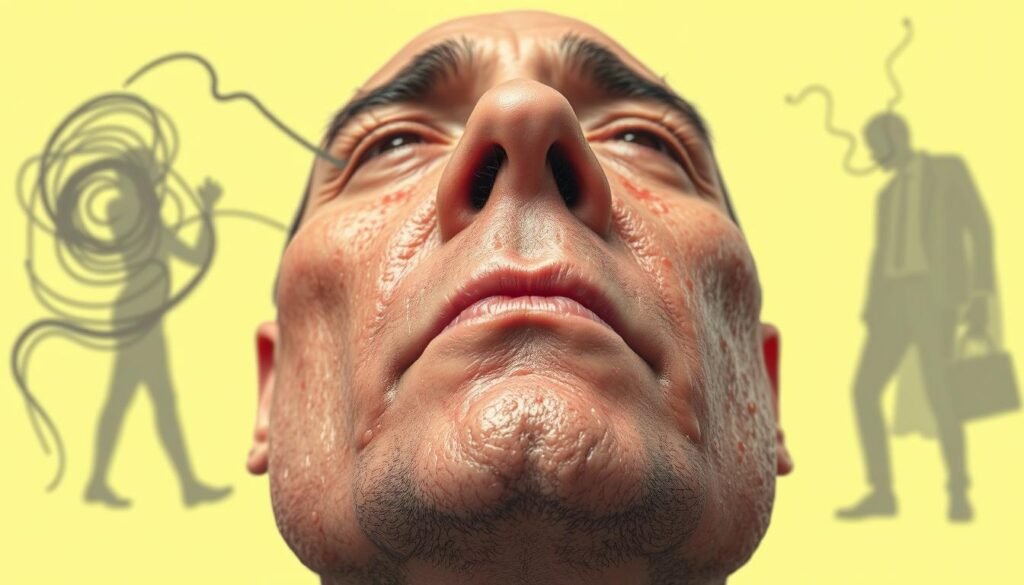Did you know acne is the top skin condition in the US, affecting around 50 million people each year? This huge number shows a big challenge that many face. It shows how stress and emotions play a big role in our skin health. Stress doesn’t just upset our minds; it can show up on our faces as acne breakouts.
It’s important to see how our feelings can make acne worse. When we’re stressed, our bodies can react in ways that make our skin oilier. This can lead to inflammation and pimples. Studies have found that people with more stress often have more acne. This connection invites us to look closer at how stress hormones and inflammation impact our skin.
Key Takeaways
- Acne affects up to 50 million people in the U.S. each year, emphasizing its prevalence.
- Research shows that stress can exacerbate acne conditions and slow healing.
- Psychological factors such as emotional distress significantly impact skin health.
- Understanding the mind-skin connection is vital for effective acne treatment.
- Stress management techniques can help improve acne symptoms.
Understanding the Connection Between Stress and Acne
Stress can really affect your skin, especially when it leads to acne. When we’re stressed, our bodies produce more cortisol. This hormone increases oil production, clogging pores and causing breakouts.
Studies show that stress can make skin problems worse. For example, a study at Stanford University found that students got more acne during exams. This proves that stress from school can cause more breakouts. In Singapore, a study showed that high school students had more acne during exams than during summer break. So, stress doesn’t just make acne worse; it’s a direct cause of it.
Stress does more than just make our skin oily. It also leads to inflammation because it makes our bodies produce cytokines. This can make acne even worse, starting a cycle of stress and skin issues. People with certain skin problems, like acne excoriee, might pick at their skin because of stress. It’s important to see a dermatologist and find ways to manage stress.
Stress can disrupt our healthy habits, leading to more acne. This includes not sleeping well and eating poorly. But, doing things that lower stress can help. This means exercising, meditating, and eating right. It’s important to take care of both our minds and bodies.
The Role of Cortisol in Skin Health
Cortisol is the main stress hormone that affects our skin. High cortisol makes the sebaceous glands produce more oil. This can lead to oily skin and more acne. Stress raises cortisol levels, causing chronic inflammation. This makes skin issues like eczema and psoriasis worse.
Stress doesn’t just change how our skin looks. It can also slow down healing, making skin problems worse. When our skin is stressed, it’s more prone to irritation and damage. Stressful times might make us pick at our skin. This can cause more acne and even lead to infections.
But there’s more to it than just acne. High cortisol levels can also reduce collagen and protein production. This speeds up how quickly our skin ages. Stress and skin health are closely linked. Managing stress through exercise, sleep, and good skincare can help keep our skin healthy.
How Stress Affects Hormonal Imbalance
Stress greatly affects the body’s hormonal balance, leading to skin problems. The stress response triggers the hypothalamic-pituitary-adrenal (HPA) axis. This results in the release of hormones like cortisol. High levels of cortisol can upset your hormone balance. This can worsen skin health, causing or exacerbating skin conditions such as acne.
A study showed how stress links to acne severity. It involved 144 female medical students in their sixth year, where 72.2% experienced mild acne. Interestingly, higher stress levels were connected to more severe acne. This shows a definite link between stress and skin issues.
Table 1 showcases the connection between stress levels and acne severity across different studies:
| Study | Sample Size | Correlation (r) | Significance (p) | Key Findings |
|---|---|---|---|---|
| King Abdulaziz University | 144 | 0.23 | Stress severity correlates with acne severity. | |
| University of Melbourne | 67% | N/A | N/A | Identified stress as an exacerbating factor. |
| Korea Multicenter Study | N/A | N/A | N/A | 82% reported psychological stress as a trigger. |
| Singapore Study | 94 | 0.23 | 0.029 | Statistically significant correlation found. |

Inflammation and Its Impact on Acne Development
Stress and inflammation are closely linked, affecting how acne develops. Stress triggers the immune system, causing inflammation. This leads to redness and swelling, worsening acne or causing new breakouts.
Long-term stress raises cortisol, making oil glands overactive. This excess oil, along with clogged pores, fosters acne. Hormonal changes from menstrual cycles, pregnancy, or menopause also increase oil production, leading to more acne.
Genes matter too in how stress affects our skin. People with a family history of acne might have more issues under stress. Also, some medicines, like corticosteroids, can cause inflammation and acne.
Understanding the link between stress, inflammation, and acne helps in finding ways to manage it. By addressing these root causes, clearer skin and better health can be achieved.
Stress and Acne Breakouts: The Psychological Link
The link between how we feel and skin health is important in acne formation. Stress can cause skin problems, especially for those who get breakouts easily. Knowing about this link can help us understand how our feelings affect our skin.
Emotional Responses Aggravating Skin Conditions
Stress is known to possibly trigger or make acne worse. It can increase inflammation in the body, which can lead to acne. Stress makes the body produce more cortisol, causing our sebaceous glands to make extra oil. This shows why managing stress is key for both our mind and skin.
Impact of Self-Esteem on Skin Health
Chronic acne can make self-esteem issues worse and start a tough cycle. Feeling bad about oneself can increase stress, leading to more acne. This shows the need for both skin care and mental health support.
Practices like body neutrality can help people value themselves beyond skin issues. Getting help from professionals can offer ways to deal with stress and boost well-being, leading to better skin health.
How Stress Promotes Increased Sebum Production
Chronic stress greatly affects sebum production in the skin. It causes more cortisol to be made, which then activates the sebaceous glands. This action leads to too much oil, which results in oily skin and a perfect place for acne.
Excessive oil makes pores clog up more. Add dead skin and bacteria, and acne is likely to happen. It’s key to know this link to keep skin healthy when stressed.
A routine with medical-grade skin care products can calm skin and handle oily problems. This helps avoid acne issues. Exercise helps too by boosting mood and lowering stress, thanks to hormone release.
Activities like reading, meditating, or deep breathing can also cut down chronic stress. Managing stress is important because it can mess up sleep and eating habits, making skin worse. Tackling these areas improves skin health and reduces stress’s bad effects on sebum.
For more insights into how stress impacts acne development, refer to relevant studies and expert opinions.

The Effect of Clogged Pores on Skin Health
Clogged pores are a big problem for skin health and can lead to acne. Stress and other factors can make things worse by causing more oil and debris to build up. Knowing why pores get clogged and how to treat them helps keep skin clear and lowers the chance of breakouts.
Causes of Clogged Pores
Many things can cause pores to get clogged:
- Excess oil production tied to hormonal changes, especially during stress.
- Dead skin cells piling up on the skin’s surface.
- Bacteria growing too much in hair follicles.
- Outside pollutants and stress from the environment.
- Using the wrong skincare products, like ones that are too heavy or block pores.
When these factors combine, they can lead to clogged pores and acne. It’s important to know these causes to pick the right acne treatments.
How to Unclog Pores Effectively
Here are some ways to fight clogged pores for healthier skin:
- Add exfoliation to your skincare to remove dead skin. Use products with salicylic or glycolic acid.
- Clean your skin twice a day with a soft cleanser. This gets rid of extra oil and dirt.
- Try clay masks to pull out dirt and absorb extra oil.
- Choose makeup wisely. Use products that don’t clog pores.
- Talk to a skin doctor about special treatments like retinoids. They help open pores and stop breakouts.
Having a skincare routine that fits your skin type is key. It keeps your skin moist and healthy. Preventing clogged pores is central to treating acne well. It also helps your skin stay clear.
Diet and Nutrition: Fueling the Stress-Acne Cycle
The connection between what we eat and skin health is key in managing stress acne. What you eat affects your hormones and skin. This makes choosing healthy foods very important when you’re stressed. Unhealthy food choices when stressed can make acne worse. Picking the right foods helps control this and keeps your skin healthy.
Foods to Avoid When Stressed
Some foods can make acne worse during stressful times. Here’s what to stay away from:
- High-sugar foods: They can raise insulin, leading to more oil and inflammation.
- Dairy products: Dairy might increase acne for some, maybe because of hormones in milk.
- Saturated and trans fats: Found in junk food, these fats can mess with your hormones and skin.
- Hyperglycemic carbohydrates: Foods like white bread spike your sugar levels, causing skin problems.
Choosing better foods can lessen the stress-acne relationship. Eating mindfully and selecting balanced meals helps avoid stress snacking.
Beneficial Foods for Skin Health
Eating foods good for your skin can improve its health and fight stress effects. Some great choices include:
- Leafy greens: Full of vitamins and minerals, they help fix and calm your skin.
- Fatty fish: These fish have omega-3, which controls hormones and moisturizes the skin.
- Nuts and seeds: They provide zinc and vitamin E, helping your skin heal and stay healthy.
- Berries: Full of antioxidants, they battle the stress that can lead to acne.
Adding these foods to a balanced diet can strengthen your body and mind. It may also cut down on stress eating and its skin effects. For more tips, check out this resource.
| Food Type | Benefits | Notes |
|---|---|---|
| Leafy Greens | High in vitamins A, C, and K | Supports skin health and reduces inflammation |
| Fatty Fish | Rich in omega-3s | Helps regulate hormones and hydrates skin |
| Nuts and Seeds | Provide zinc and vitamin E | Promotes healing and prevents acne |
| Berries | High in antioxidants | Fights oxidative stress that can worsen acne |
Being aware of your diet’s effect can greatly change the stress-acne connection. By eating nutrient-dense whole foods, you can feed your body well. This can reduce stress-related acne problems.
Exploring Anxiety Management Techniques for Better Skin
Managing anxiety helps both your mind and skin stay healthy. Stress increases cortisol levels, making the skin oily. This may lead to acne. By managing stress, you can avoid these skin problems.
Mindfulness meditation, yoga, and deep breathing exercises help reduce stress. They make you feel calm and control cortisol. Doing these regularly improves your mind and skin.

Getting help from professionals is important for managing anxiety. A therapist or counselor gives you tools to fight stress. A dermatologist will help address both emotional and skin issues. The American Academy of Dermatology notes that stress and acne are linked. Stress can make skin problems worse.
- Exercise lowers stress and makes your skin healthier.
- Eating well helps your skin from the inside.
- Skincare routines with aloe vera, chamomile, and oatmeal ease skin stress issues.
Mental wellness is key to clear skin. Adding these practices to your life helps both mind and body. To learn more about preventing acne through lifestyle, check this resource.
Improving Your Skincare Routine Under Stress
During stressful times, updating your skincare routine is key to keeping your skin healthy. Stress increases cortisol, leading to more oil and acne. It’s important to stick with your skincare even when things get tough.
- Prioritize a balanced diet: Eating fruits, vegetables, proteins, and healthy fats helps manage stress. This can mean fewer acne problems.
- Maintain hydration: Drink plenty of water and use good moisturizers. This keeps your skin’s barrier strong against damage and irritants.
- Opt for gentle products: Choose skincare that won’t irritate. Ingredients like aloe vera or chamomile are calming.
- Incorporate regular physical activity: Exercising for 30 minutes most days reduces stress. This is good for your skin too.
- Ensure quality sleep: Try to get 7-9 hours of sleep every night. It helps fight stress’s effects on your skin.
Handling stress is a big part of fighting acne. Using methods like mindfulness or getting help from therapists can make a big difference. If acne doesn’t improve, seeing a dermatologist is a good idea. They can offer treatments that suit your skin best, combining skincare and stress reduction.
The Mind-Body Connection in Skin Health
The mind and body work together closely, especially when it comes to skin and problems like acne. Stress is a big cause of acne for a lot of people worldwide. Understanding how our feelings affect our skin shows why it’s important to care for both our minds and bodies.
When we’re stressed, our body makes more of the “stress hormone” cortisol. This can make the oil glands in our skin work overtime. This can make acne worse. Stress also triggers inflammation in the skin, which can aggravate acne.
To help our skin look its best, it’s important to reduce stress. Practices like mindfulness can help. Working out can reduce stress hormones and improve blood flow. Getting enough sleep is crucial, too. Bad sleep can raise stress levels and harm our skin.
Treating the mind can help with acne. Cognitive behavioral therapy (CBT) is one way to help. It can lessen the emotional strain of acne. Stress can make it hard for the skin to heal and maintain its barrier.
To support skin health, eat foods that fight inflammation, like fish and flaxseeds. Eat lots of fruits and veggies for their antioxidants. Choose skincare products wisely to help with stress-related acne.
It’s clear that our mental health affects our skin. Tackling stress can make a big difference in skin condition. For deeper understanding, look at the research on stress and skin health.
Conclusion
It’s essential to understand how stress affects our skin. Around 50 million Americans deal with acne, a condition worsened by stress. A study found that 67% of medical students saw their acne get worse with stress, especially during exams. Tackling stress with effective management techniques can help clear your skin.
Adopting a comprehensive care approach is key. This includes skincare and mindfulness practices. Activities like gentle cleansing, exfoliation, and staying hydrated help manage acne. They also lower stress-related inflammation. Impressively, 93% of people in stress management programs saw their acne improve. This shows the importance of combining mental care with skin routines.
Addressing emotional well-being is crucial for acne prevention. Acne sufferers often experience anxiety and low self-esteem. This creates a harmful loop. By using strategies that tackle both mind and skin, individuals can boost their confidence and achieve clearer skin.